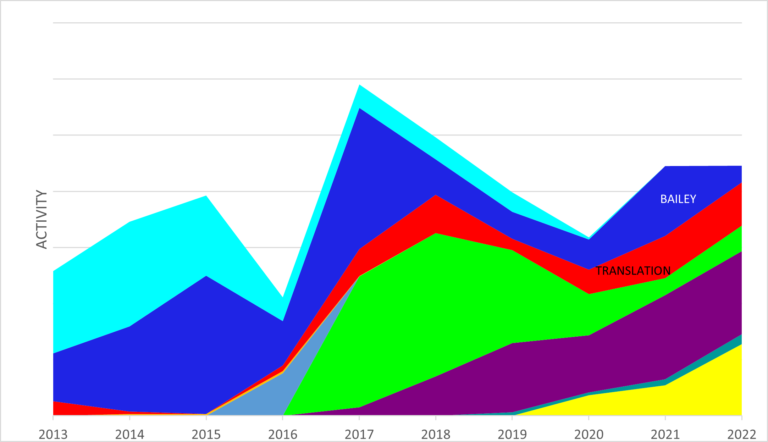Those of you who have worked with me at any time over the ten-year existence of my personal enterprise, ‘Bailey’, will know me either as an English trainer (approx. 90% of my activity on average) or through my translating, interpreting and related services, accounting for the remaining 10% or so.
As an English trainer, I have my own company, and hence a ‘SIREN’, which is its unique identification number in the French company directory.
Amongst several possibilities, I’ve chosen the status of ‘Entrepreneur Individuel’ (EI), and in addition, I’m declared as an official ‘Organisme de Formation’ (OF), or Training Organisation, on the current list of French training organisations, where you can find me amongst a few other Baileys, by using the simple ‘search’ tool!
Once I had created my enterprise as an independent consultant trainer and obtained the official SIREN back in 2013, I then declared my activity to the public authorities (Prefecture) and subsequently my company (not me personally) has a ‘Numéro de Déclaration d’Activité’ (NDA). I’m also required to declare an annual ‘Bilan Pédagogique et Financier’ (BPF) in order to maintain my ‘declared’ status and keep my place on that list of official training organisations.
This all means that many of you (accounting for around 30% of my activity, on average) have been able to work directly with me and my little company, though this has already changed to some extent.
The chances are that you’re more likely to have come across me through one of the six different training organisations (including a business school and an engineering school) that have subcontracted me at some time or another to train their own clients/students/English learners.
As you can see from the chart below, subcontracted work has been a mainstay of my business over the last ten years. It was there right at the beginning of my enterprise, accounting for 50-60% of my activity, and it is still very much present today, to the tune of about 70-75% of my current activity. (Each colour curve represents a training organisation for whom I have sub-contracted)

Of course, I’m not alone on the market!
Independent trainers like myself accounted for 38% of nearly 120,000 training organisations in France in 2021,
so there are more than 45,000 of us.
Around 60% of us act as subcontractors for other training organisations, and this is clearly an important part of our activity.
So what's changing?
The law of 19 December 2022 specifically related to the personal training account (CPF) introduced a new article in the Labour Code concerning the case of subcontracted vocational training initiatives.
Under this article, the sub-contracted independent trainer must have made a declaration of activity and provide proof of compliance with the conditions defined by law. A decree by the Conseil d’État is due to specify how this article is to be implemented, but it has yet to be published.
Much more salient than the now mandatory activity declaration and NDA, the law of 19 December also states that all trainers involved in training courses financed (in whole or in part… there lies another story!) by the CPF must also be enrolled in the Qualiopi certification process.
CPF?
The Compte Personnel de Formation (CPF), or Personal Training Account, enables people to acquire training rights that can be used throughout their working lives. It is universal in scope and is open to all working people, as well as the unemployed.

But how can a sub-contracting independent trainer become Qualiopi certified?
It’s interesting to consider how Qualiopi certification could be audited in the case of the many independent trainers, like myself, who principally or exclusively work as sub-contractors to other training organisations, since we do not have our own ‘process’ to be audited.
Instead, we need to interface with the ‘processes’ of each of our client training organisations: in my case, currently five of them!
Arguably, this is one of the strengths of a good independent trainer: we understand the criteria upon which the Qualiopi system of certification is based and we ‘fit in’ with the choices that each of our clients has made in order to comply with it.
For instance, each training organisation has its own way of establishing the training needs and entry levels of their learners, and whatever form that takes, we translate those needs into a coherent training programme that we will deploy with our clients’ learners.
As the training programme proceeds, we need to keep our clients continually updated on the progress of their learners, giving feedback on the content of each training session, along with any mid-course assessments that may be required.
Each of our client training organisations has chosen their own specific interface for us to do this: sometimes we upload information onto a OneDrive or Dropbox folder, for others we have a Word or Excel document to complete and send.
Likewise, upon completion of the training course, we will need to make some form of evaluation of the learners’ progress and achievements, and in each case the format will be specific to our client training organisation.
Maybe for one, it will be a written assessment to be submitted; another may have their own table with ‘drop-down’ menus to select from, and in each case we need to adapt to the choices our client has made.

All in all, independent trainers sub-contracting to several client training organisations need to be very agile when it comes to understanding and adapting to the ‘processes’ chosen by our clients, and we become adept at operating within a variety of systems and using diverse tools.
We are also in a very good position to compare and evaluate the different ‘processes’ our clients have adopted: one could say that we’d even make ideal candidates to become Qualiopi auditors ourselves!
So what's the good news?
Hence, the latest news on the draft decree which was presented last week (20/07/23) to the Sub-committee on employment, vocational guidance, and training (SC-EOFP) of the CNNCEFP is good news for us independent trainers.
Basically, as a subcontractor, you are not affected by the obligation to obtain authorisations and certifications, in particular the obligation to obtain Qualiopi certification, as long as you meet the following conditions:
You are covered by the ‘micro-social security’ system, individual self-employed entrepreneurs, micro-entrepreneurs, etc., and you have an annual turnover of less than €77,700 excluding VAT.
You are dispensing one or more parts of a training course.
These conditions apply only if no other specific legislative or regulatory provision requires you to hold certification or authorisation.


